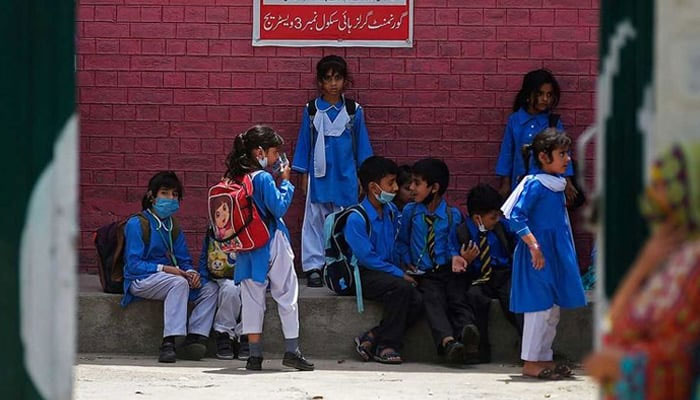Pathway to progress
Education is a vital instrument for a state’s development. Young people are considered as the future of the nation. In Pakistan, this future seems to be at risk. This is due to poor educational facilities, poverty, lack of awareness, and coherence in the educational system.
Education is considered as an investment, and its importance has been highlighted since the beginning of time. In his writings, Plato argued that “if a man neglects education, he walks lame to the end of his life”.
An estimated 22.8 million children aged 5-16 are out of school in Pakistan, which is 44 per cent of the total population of that age group, Unicef. Though these 22.8 million children have many revolutionary ideas, their lack of education will prevent them from putting them to use.
Given the interchangeable relationship between education and economic growth, this is likely to have a significant impact on Pakistan’s overall GDP development. Education helps people develop and improve their lives. And as education opens gates for career opportunities, people develop much-needed social skills and confidence, which in turn help them contribute towards the nation’s economic growth.
According to reports by the Pakistan Institute of Development Economics (PIDE), Pakistan tends to have an inequitable and inadequate distribution of education, which is likely to result in a negative impact on the per-capita income. Pakistan’s education system has been divided into many different sectors which has resulted in disparity and discrimination between citizens. While women and those living in rural regions are frequently left behind, men and those living in urban areas are more likely to have access to a better standard of education.
The gaps between students who have completed SSC/FSC and those who have completed O and A Levels are widening. The SSC/FSC system offers far less variety of subjects compared to international standards. Students are being taught out-of-date material in addition to the curriculum’s inadequate quantity. The matric/inter curriculum makes it less probable for students to be accepted in foreign universities and have access to the same opportunities as O/A level students have.
To fight against this imbalance, it is imperative to ensure that a single unified national curriculum is introduced which is followed by both public and private schools on all levels. By taking such measures the distinction between the upper, lower, and middle classes will be reduced as they will be receiving the same standard of education. This will result in an equal range of opportunities that one may benefit from since the skills possessed by everyone are likely to be of similar quality.
By reducing the distinction and ensuring that everyone has equal opportunities, elitism is likely to come to an end. This is because those who are from low-income households will be able to take advantage of the similar prospects as available to those of the privileged background. Increasing competition in the market results in people receiving good jobs and opportunities based on their credentials, not merely based on their family background.
It is also crucial to ensure that further awareness of the importance and value of education is given in rural areas. Currently, according to statistics provided by the Ministry of Education, the literacy rate in rural areas is 45 per cent. The consequence of this is that it has resulted in rural-urban immigration, as people in search of better opportunities in education and employment tend to move to urban areas.
Pakistan has long suffered from the gender disparity in the country’s education sector. Currently, more than 40 per cent of Pakistani women do not have formal education, the effects of which are both social and economical. Former minister for human rights Mian Riaz Hussain Pirzada thinks that one of the main reasons for child marriages in Pakistan is lack of education. These child marriages further impact society negatively as they result in a higher rate of population growth.
It is important for policymakers to understand that developing women’s potential can also have a significant effect on economic growth. The 20th century saw a significant shift in the economies of numerous nations as more women continued their education and entered the workforce in greater numbers.
As per a study conducted by the John Hopkins Institute for Clinical and Translational Research in 2019, educated women and those who are ready to join the labour force will help the nation boost its economic growth as there will be a wider pool of labour and this is likely to raise productivity.
Women with education have a higher likelihood of being aware of the problems related to abuse and violence. A woman’s confidence increases with each year of education; a self-assured woman is more inclined to work outside home and stand on her feet.
The constitution, in Article 25A, provides the right to free and compulsory education to children between the ages of five and 16. Additionally, the International Covenant on Economic, Social and Cultural Rights (ICESCR) devotes two articles to the right to education, namely Article 13 and Article 14, and as Pakistan has ratified the ICESCR, it makes it essential for it to adhere to the principles laid in the covenant. Pakistan’s constant failure to ensure the 22.8 million children, who have been denied their right to education is a breach of not only their constitutional obligations but also the breach of their national and international obligations.
The general economic situation of Pakistan is projected to improve with an enhanced educational system and by providing free and mandatory education to everyone. Along with encouraging entrepreneurship and technical advancements, education can boost productivity and creativity.
Education also helps society to grow at large. Currently, Pakistan is facing a surge in crime rates. Education helps shape an affluent society to live in by knowing and respecting rights, laws and regulations. Those who are educated have better job prospects and acknowledge the eminence of hard work, and the distinction between right and wrong. Education helps them become better citizens, hence reducing the crime rate and increasing the standard of living.
Ultimately, education reforms and providing mandatory and free education in Pakistan are a necessity, imperative for the nation’s progress. It is high time we prioritized and enhanced the educational framework as it is an instrumental tool to unlock Pakistan’s untapped potential and pave the way for a prosperous future. Let’s remember that the strength of a nation lies in an educated society.
The writer is a freelance contributor.
-
 Detective Chief Inspector Reveals How Andrew Got Treated In Police Custody
Detective Chief Inspector Reveals How Andrew Got Treated In Police Custody -
 Gemini 3.1 Pro Unveiled: Google’s Next-gen AI For Advanced Reasoning & Faster Enterprise Workflows
Gemini 3.1 Pro Unveiled: Google’s Next-gen AI For Advanced Reasoning & Faster Enterprise Workflows -
 Oprah Winfrey Talks About Weight-loss 'tool To Manage' Health
Oprah Winfrey Talks About Weight-loss 'tool To Manage' Health -
 Texas Emerges As World's Future Data Center Capital
Texas Emerges As World's Future Data Center Capital -
 South Korea’s Ex-President Yoon Issues Public Apology After Being Sentenced To Life Over Martial Law
South Korea’s Ex-President Yoon Issues Public Apology After Being Sentenced To Life Over Martial Law -
 Eric Dane Recorded Episodes For The Third Season Of 'Euphoria' Before His Death From ALS Complications
Eric Dane Recorded Episodes For The Third Season Of 'Euphoria' Before His Death From ALS Complications -
 Inside Morning Of Andrew’s Arrest And How He Responded: ‘Do You Know Who I Am?’
Inside Morning Of Andrew’s Arrest And How He Responded: ‘Do You Know Who I Am?’ -
 OpenAI Sam Altman Predicts AI Superintelligence By 2028: Is Humanity Ready For A Turning Point?
OpenAI Sam Altman Predicts AI Superintelligence By 2028: Is Humanity Ready For A Turning Point? -
 WhatsApp Rolls Out Group Message History To Ease Group Chats
WhatsApp Rolls Out Group Message History To Ease Group Chats -
 Tesla Expands Cybertruck Lineup With Affordable Model In US, Slashes Cyberbeast Price To Boost Demand
Tesla Expands Cybertruck Lineup With Affordable Model In US, Slashes Cyberbeast Price To Boost Demand -
 AI Is Not As Powerful As We Think, Says Mathematician Hannah Fry
AI Is Not As Powerful As We Think, Says Mathematician Hannah Fry -
 How Andrew's Feeling Since His Arrest & Subsequent Release Amid Tech & Computers Seize
How Andrew's Feeling Since His Arrest & Subsequent Release Amid Tech & Computers Seize -
 Trump Officially Directs US Agencies To Identify And Release Files On Extraterrestrial Life
Trump Officially Directs US Agencies To Identify And Release Files On Extraterrestrial Life -
 2026 Winter Olympics: Alysa Liu Claims Gold, Snapping 20-year Drought For US Figure Skating
2026 Winter Olympics: Alysa Liu Claims Gold, Snapping 20-year Drought For US Figure Skating -
 Hilary Duff Opens Up About Marriage Fears Despite Strong Bond With Matthew Koma
Hilary Duff Opens Up About Marriage Fears Despite Strong Bond With Matthew Koma -
 ‘Grey’s Anatomy’ Star Eric Dane Breathes His Last At 53
‘Grey’s Anatomy’ Star Eric Dane Breathes His Last At 53




